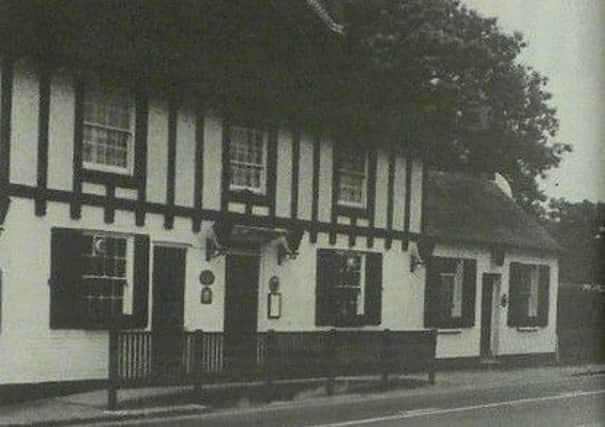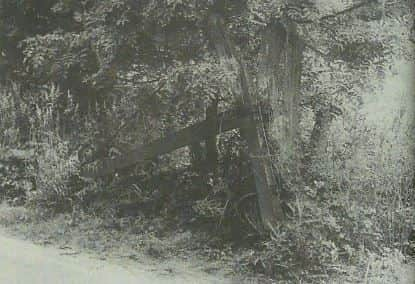A haunting tale of the tragic spirits at a very old pub


Jacob Harris was a highway robber who attacked Richard Miles – landlord of the old Royal Oak pub, in Wivelsfield – on May 26, cutting his throat before attacking his wife, Dorothy, and a serving girl for their £20 takings.
Harris fled with his ill-gotten gains to The Cat, in West Hoathly – a well-known smugglers’ haunt – where he heard the hunt for his capture was on. He moved on to Selsfield House, at Turners Hill, where he hid in the wide parlour chimney.
Advertisement
Hide AdAdvertisement
Hide AdBut for a chance shower of rain he might never have been found. The officers hunting him called at the house and lit a fire in the parlour to dry their uniforms.


The smoke was too much for Harris who soon fell, spluttering, into the room. After a fierce struggle, he was captured.
Meanwhile, poor Richard Miles, his wife and the serving girl, had died from their wounds and Harris was now a multiple murderer.
He was duly tried and, on August 31 1734, was hanged at Horsham gaol. His body was taken to a gibbet near the Royal Oak and left to disintegrate.
Advertisement
Hide AdAdvertisement
Hide AdA replica of the post, with a metal rooster attached to the top, was erected on the site.
It was said that to touch the post would cure any ailment and any ‘believer’ who visited the pub would find a small part of the original gibbet – with its ‘curative powers’ – hanging on the wall close to the bar.
Many might think that would have been the end of the tragic tale of the Royal Oak murders – but it was said the voice of the serving girl could sometimes be heard in the rear corridor of the pub, screaming “Mr Miles, Mr Miles...”.
A contributor to the website Ye Olde Sussex Page (www.yosp.co.uk) shared part of a ballad which was written after Jacob Harris was hanged. It read:
“And where he did the crime they took the pains
To bring him back and hang him up in chains
That there he might be seen by all that passed by
I wish all people who will cast an eye;
It is a dismal sight for to behold
Enough to make a heart of stone run cold
So to conclude I hope you will take care
And of all willful sin, I pray, beware;
Let’s serve the Lord with all our might
And he will guard us day and night.”
Advertisement
Hide AdAdvertisement
Hide AdThe contributor added a tale of alcohol-fuelled daring, which left one Royal Oak punter trembling.
He write: “Jacob’s Post is supposed to be haunted and has since been the basis for many tales of dreadful happenings.
“Local folk were not keen to pass it after dark and always gave it a wide berth if they had to pass by it, even in the daylight.
“One night a drinker at a local pub was dared to go and stand by the memorial at midnight. Unknown to him, one of his mates had slipped out first and hidden himself nearby.
Advertisement
Hide AdAdvertisement
Hide Ad“When the decidedly nervous hero got to the spot, he did his best to keep up his courage by talking to the ghost ‘Hello Jacob, how are you tonight?’
“From the shadows came the reply ‘Very wet and cold’.
“The poor quivering man turned and ran, and didn’t stop until he had reached the safely of the bar parlour and was again surrounded by his friends. When the joke was explained to him, he failed to appreciate the humour of it - although it kept the regulars at the pub entertained for weeks.”
Remains of the Royal Oak turnpike toll gate
There was a time when the smaller building attached to the former Royal Oak pub, in Wivelsfield, was a toll house.
It stood on a prominent turnpike, dated 1770, and a toll gate spanned the road in front of it.
Advertisement
Hide AdAdvertisement
Hide AdThis picture was taken in 1988 and shows the remains of the remains of the old toll gate.
Toll roads began in Sussex around the time of the Norman Conquest in 1066. One of the earliest was at Barcombe Mills where the road crossed the River Ouse.
Payment in such times was made by bullock or hide and in return the landowner was expected to keep the roads and bridges to a satisfactory standard.
Cash was used at toll gates from the end of the 13th century and, by the end of the 17th century, Turnpike Trusts were set up and approved by Parliament.
Advertisement
Hide AdAdvertisement
Hide AdThe first in Sussex was a trust established in 1696, covering the road from Crawley to Reigate.
Turnpikes and toll roads fell into disuse during the 19th century when the coming of the railways revolutionised transport.
The people of Wivelsfield, though, were anxious to preserve their past and did not destroy their gates when tolls were abandoned.
Instead, it was reinstalled about 200 yards south of the pub beyond the sharp bend.
Advertisement
Hide AdAdvertisement
Hide AdDon’t miss out on all the latest breaking news where you live.
Here are four ways you can be sure you’ll be amongst the first to know what’s going on.
1) Make our website your homepage at www.midsussextimes.co.uk
2) Like our Facebook page at www.facebook.com/midsussextimes
3) Follow us on Twitter @midsussex_times
Advertisement
Hide AdAdvertisement
Hide Ad4) Register with us by clicking on ‘sign in’ (top right corner). You can then receive our daily newsletter AND add your point of view to stories that you read here.
And do share with your family and friends - so they don’t miss out!
The Mid Sussex Times - always the first with your local news.
Be part of it.